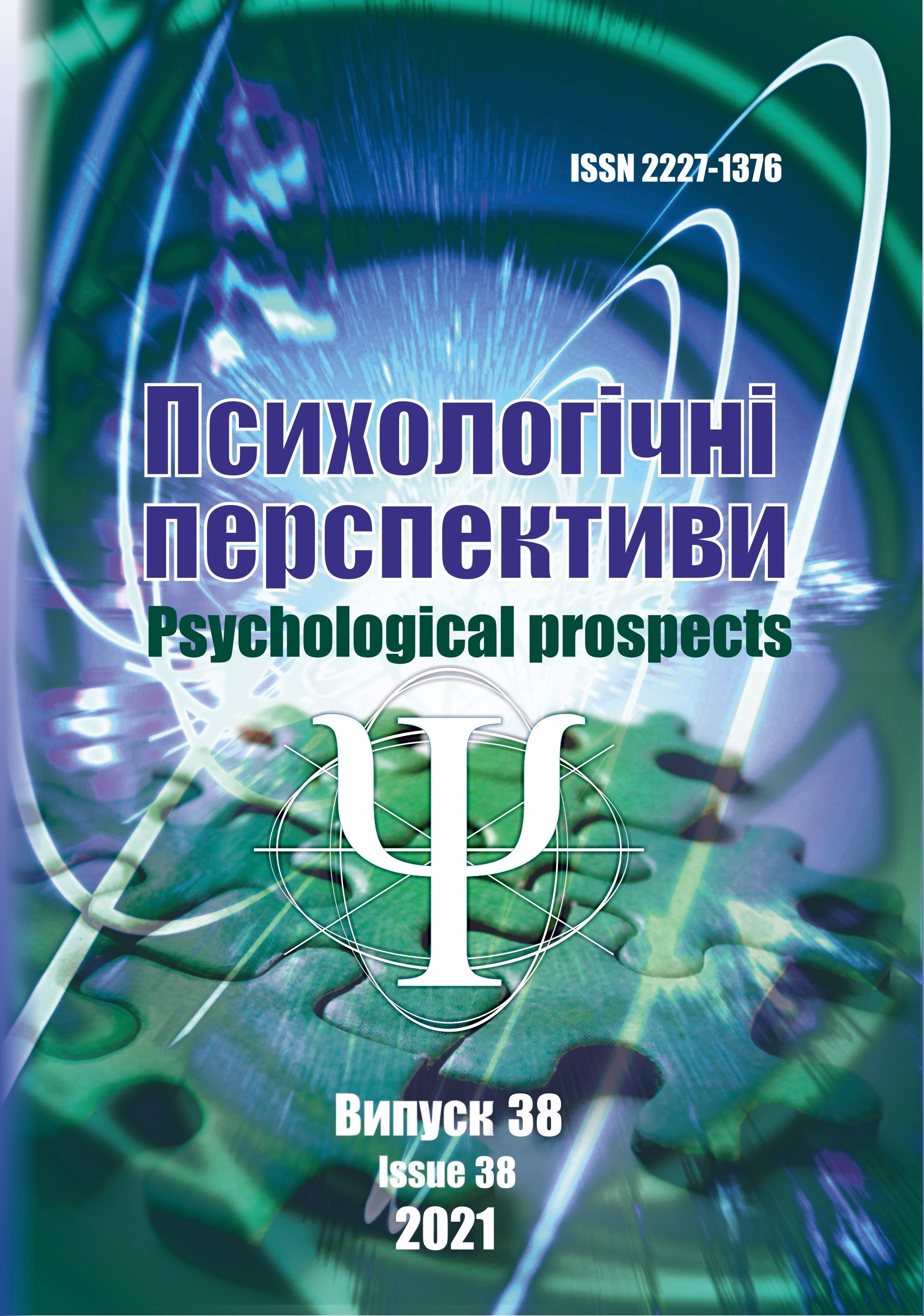The emotional attachment of the child to the mother as a predictor of its social adaptation to school education
DOI:
https://doi.org/10.29038/2227-1376-2021-38-138-149Keywords:
emotional contact, maternal-child relationships, mother’s support, reliable type of attachment, educational activity.Abstract
Purpose. The proposed article provides a theoretical analysis and empirical verification of the position that the type of attachment of the child to the mother is one of the factors of social adaptation of the first to school. Methods. Theoretical socio-psychological analysis of the phenomenon of emotional connection between child and mother in relation to its importance in the issue of social adaptation of the child. Based on the theoretical research and generalizations, a program of empirical verification of certain provisions was developed, which was implemented through the methods of conversation and survey. Results. A theoretical review of the subject of research in the scientific literature revealed that among the social factors that influence the process of adaptation of the child to school, scientists single out the acceleration of life, increasing educational requirements, changing life stereotypes and lifestyles. One of the modern factors of children's adaptation today is the difference between preschool and school educational environments. The more varied the educational environments of preschool and school childhood, the more relevant the problems of ensuring continuity between them. In addition to these reasons, researchers suggest paying attention to the position of the mother, the quality of the child's attachment to the mother, the style of child-parent relationship, the mother's own attitude to the educational institution. According to researchers, emotional attachment is necessary for the full mental development of the child, serves as a sense of security, promotes self-development, success and socialization. environment. As a result, children with a reliable type of attachment adapted to school most successfully and emotionally calmly, characterized by easy contact with peers and teachers. Conclusions. The paper analyzes the social and personal factors that children encounter in the process of their social adaptation to school. It has been proven that a number of conditions that affect a child’s personality when he or she begins the learning process include the type of attachment to the mother, her support, and help.References
Bowlby, J. (2003). Priwjazannost [Attachment]. Moskwa: Gardariki [in Russian].
Bowlby, J. (2012). Sozdanie i razruschenie emozhyonalnych swjazej [Making and breaking emotional bonds]. Moskwa: Academicheskij Project [in Russian].
Ainsworth, M. D. (1983). A sketch of a career. In A. N. O’Connoll & N. E. Russo (Eds.) Models Of Achievement: Reflections Of Eminent Women In Psychology. (pp. 200-219). New York: Columbia University Press.
Belsky, J. (1999), Modern evolutionary theory and patterns of attachment. In J. Cassidy & P. R.
Sessa I, D’Errico F, (2020). Poggi I and Leone G (2020) Attachment Styles and Communication of Displeasing Truths. Front. Psychol. 11:1065. doi: 10.3389/fpsyg..01065
Bartholomew K. (1990). Avoidance of intimacy: an attachment perspective. J. Soc. Pers. Relationsh. 7 147–178. https://doi.org/10.1177/0265407590072001
Kamza, A., (2019). Attachment to mothers and fathers during middle childhood: an evidence from Polish sample. BMC Psychol 7, 79 https://doi.org/10.1186/s40359-019-0361-5
Bornstein, M. H., Suwalsky, J. T., & Breakstone, D. A. (2012). Emotional relationships between mothers and infants: knowns, unknowns, and unknown unknowns. Development and psychopathology, 24(1), 113–123. https://doi.org/10.1017/S0954579411000708
Bartholomew K., Horowitz L. M. (1991). Attachment styles among young adults: a test of a four-category model. J. Pers. Soc. Psychol, 61, 226–244. https://doi.org/10.1037/0022-3514.61.2.226
Smirnova, E.O., Radeva, R. (1999). Razwitie teorii priwjazannosti [The development of attachment theory]. Woprosy psychology - Psychology issues, 1. 105-116 [in Russian].
Galushko I.G., Mikerova G.G., Chebelko A.G. (2017). Uspeschnaja adaptazhija perwoklasnikow k obucheniju w schkole kak sledstwie wzaimodejstwija uchitelja i roditelej [Successful adaptation of first-graders to schooling as a result of interaction between teacher and parents]. Concept - Concept, 34, 47–54 [in Russian].
Litvinova, N.A. (2012). Rol psichofiziologicheskich pokazatelej w mechanizme adaptazii ymstvennoj dejatelnosti [The role of psychophysiological indicators in the mechanism of adaptation to mental activity]. Kemerovo: KSU [in Russian].
Dermanova, I.B. (Ed.). (2002) Diagnostica emozhionalno-nrawstwennogo razwitija [Diagnostics of emotional and moral development]. SPb .: Rech [in Russian].
Pupyreva, E.V. (2007). Emotionalnaja priwjazannost k materi kak faktor stanowlenija awtonomii lichnosti w mladschem schkolnom wozwraste [Emotional attachment to the mother as a factor in the formation of personality autonomy at primary school age]. Candidate’s thesis. Moskwa [in Russian].
Krizhanovska, Z. (2021). Nadijnuj tup pruw jazanosti jak osnowa rozwutku psuchichnoho zdorow ja dutunu [A reliable type of attachment as a basis for the development of a child's mental health]. Suchasni psuchologichni tendenziji pidtrumku ta widnowlennja psuchichnogo zdorowji osobustosti: teorija ta praktuka, tezu dopowidej II mizhnarod. Mizhduszhuplinarnoji konferenzii - Current psychological trends in maintaining and restoring the mental health of the individual: theory and practice, abstracts of reports II International. interdisciplinary. conference. Charkiw [in Ukrainian].
Downloads
Published
Issue
Section
License
Copyright (c) 2021 Kryzhanovska Z., Babak K.

This work is licensed under a Creative Commons Attribution-NonCommercial 4.0 International License.






